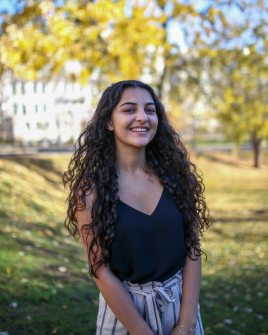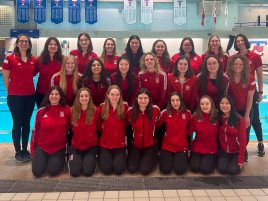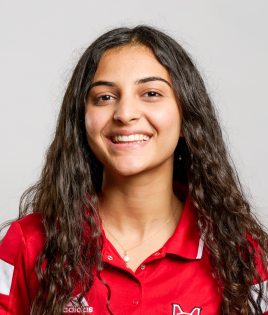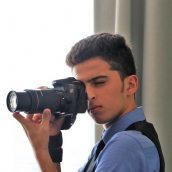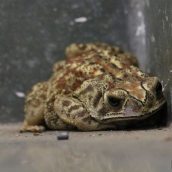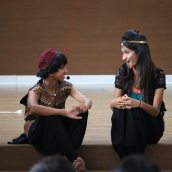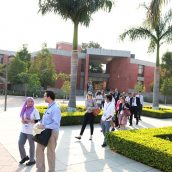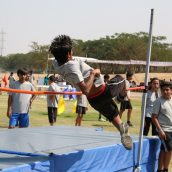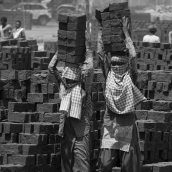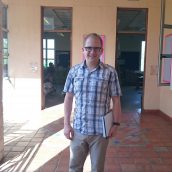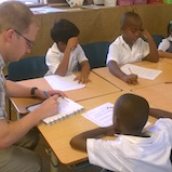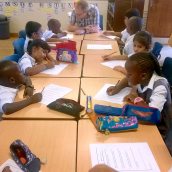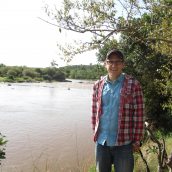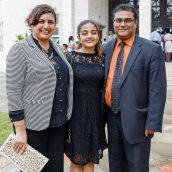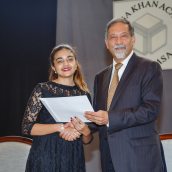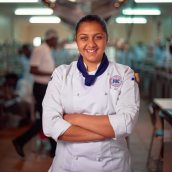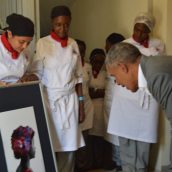News
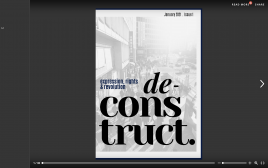
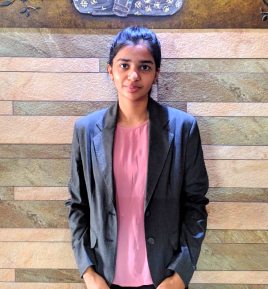

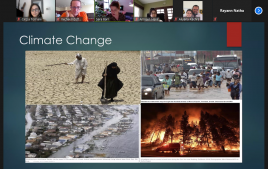
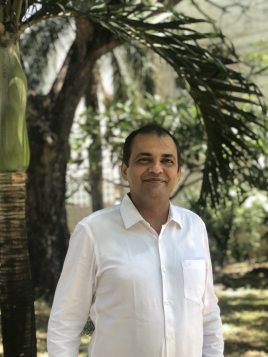

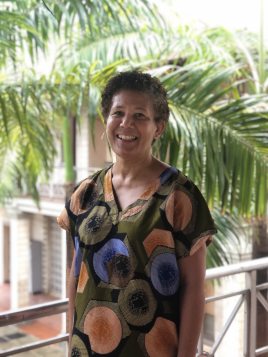
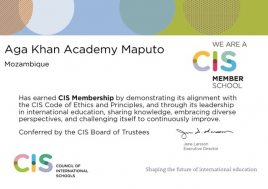

Pages
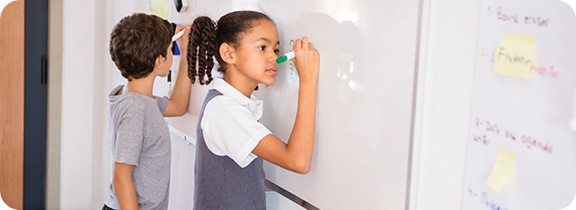
The AKA Learner Profile
The Aga Khan Academies (AKA) have developed a curriculum within the framework of the International Baccalaureate’s (IB) programmes. As such, the attributes of our learner profile are closely aligned to those of the IB learner profile.
Aga Khan Academies learners strive to be:
|
Inquirers |
We nurture our curiosity, developing skills for inquiry and research. We know how to learn independently and with others. We learn with enthusiasm and sustain our love of learning throughout life.
|
|
Knowledgeable
|
We develop and use conceptual understanding, exploring knowledge across a range of disciplines. We engage with issues and ideas that have local and global significance.
|
|
Thinkers |
We use critical and creative thinking skills to analyse and take responsible action on complex problems. We exercise initiative in making reasoned, ethical decisions.
|
|
Communicators
|
We express ourselves confidently and creatively in more than one language and in many ways. We collaborate effectively, listening carefully to the perspectives of other individuals and groups.
|
|
Principled
|
We act with integrity and honesty, with a strong sense of fairness and justice, and with respect for the dignity and rights of people everywhere. We take responsibility for our actions and their consequences.
|
|
Open-minded
|
We critically appreciate our own cultures and personal histories, as well as the values and traditions of others. We seek and evaluate a range of points of view, and we are willing to grow from the experience.
|
|
Caring
|
We show empathy, compassion and respect. We have a commitment to service, and we act to make a positive difference in the lives of others and in the world around us.
|
|
Courageous
|
We approach uncertainty with forethought and determination; we work independently and cooperatively to explore new ideas and innovative strategies. We are resourceful and resilient in the face of challenges and change.
|
|
Balanced |
We understand the importance of balancing different aspects of our lives – intellectual, physical, emotional and spiritual – to achieve well-being for ourselves and others. We recognise our interdependence with other people and with the world in which we live.
|
|
Reflective
|
We thoughtfully consider the world and our own ideas and experience. We work to understand our strengths and weaknesses in order to support our learning and personal development.
|
|
*Leaders |
We understand that multiple perspectives will allow us to make better decisions, and seek opportunities to work with a variety of others. We perceive and anticipate needs and problems, and are able to motivate ourselves and others to tackle problems, confidently and cooperatively.
|
|
*Stewards |
We understand the interconnectedness of communities, striving to create harmony in our environment, while considering the needs of all members. We are motivated to leave the world a better place.
|
© International Baccalaureate 2013
IB learner profile booklet
*Unique attributes of the Aga Khan Academies learner profile
Sujana Veeramachaneni: Teacher, Assistant Coordinator, Dorm Parent, Mentor
At the Aga Khan Academy Hyderabad, Sujana Veeramachaneni holds more than her official titles of biology teacher and Assistant Coordinator for the Diploma Programme (DP), science teacher for the Middle Years Programme, and dorm parent. Sujana also ensures her students see her as a friend, mentor and pillar of support.
“They should always feel that I’m there for them, no matter the situation, or condition or time of day,” she insists. “Sometimes I get midnight phone calls! They don’t hesitate to approach me.”
Since the majority of DP students live on campus, “My job doesn’t end in the school,” she explains. “We see them as students, and the dorm is like a home for them – so it’s like seeing them at school and at home – same child, different behaviour. Sometimes it’s difficult to draw a line, because we see them here as well as in the school – so that emotional role is with us, also."
“Of course, I have to draw the line – otherwise maintaining discipline is quite difficult – but at the same time, that line is flexible. It’s not firm – but of course, there is a thin line.”
From her side, Sujana believes that she and other staff can learn from the students’ impressive ability to control their emotions at school. “These are all teenagers,” she reflects. “We see them here, inside and outside. Sometimes, even we lose control – but the students don’t have tantrums in front of their teachers. That’s what I learn from them – how to control our emotions.”
Sujana remembers what she went through at her students’ ages, and understands the pressures they face, especially those approaching graduation from the Diploma Programme, who face multiple deadlines, university applications, and academic and personal challenges. “I always put myself in their shoes,” she emphasises, and shares with her students her anecdotes on how she dealt with stress as a student.
At the same time, she acknowledges times have changed. “This generation is under more pressure – we were not exposed to so many kinds of media or diversions. They are dealing with many things at the same time – compared to them, when we were students, we had less complexity in our lives.”
The demanding IB curriculum motivates Sujana as a teacher, even though her switch to a career in teaching was first supposed to be temporary. Sujana holds an MSc in life sciences, with a specialisation in endocrinology, and a PhD in plant physiology. Her research focused on the physio-biochemical parameters of the post-harvest life of roses, after which she worked in post-harvest floriculture in Bangalore. In 2002 she relocated to Hyderabad and started working as a teacher in an international school.
She was drawn to the demanding and challenging nature of the International Baccalaureate curriculum and in 2013 joined the Aga Khan Academy as a biology teacher. Her career at the Academy has been a learning trajectory: “I’m definitely enjoying the professional development here.” She highlights the different positions she has held over the years, as well as gaining confidence over the years in teaching, helping, and guiding Special Education Needs (SEN) students, and the training, support and resources she has received from the SEN specialist at the Academy.
She also appreciates that the Academy itself is always developing – every year different projects, opportunities and ideas are introduced or planned for the future, and she praises the community service that the school ensures students experience: “It is inculcated in the students – the mission itself is very good and strong.”
The Academy is also always learning from its students; if, for example, some students stand out at drawing or music, the staff will learn from those strengths, and apply what they learn with students in the next batch. The curriculum is reviewed every year, and coordinators and deans take sessions every year to improve and upgrade their skills.
Academically, Sujana especially appreciates the opportunities students have to explore their own interests and to learn independently – “That is the beauty of the Extended Essay.”
“It’s very dynamic,” she explains, and she describes the Extended Essay as a “piece of research work, where the student will find their passion” and submit an essay akin to a mini-thesis.
Because “the curriculum has the scope to identify the strength of the student in different ways” and “the student will design their own labs,” independence and the opportunity to follow one’s own interests is important: “Every student’s choice is different,” she says.
As their teacher, Sujana enjoys the intricacies of guiding the students individually and tailoring her teaching style to their interests and strengths. This year, she is supervising six students, whose self-selected Extended Essay projects explore a range of topics including hydroponics, the greenhouse effect and carbon dioxide concentrations, mushroom cultivation, seed germination, and the effect of music on the growth of plants.
Sujana enjoys being able to show her dynamic, expressive side at the Academy and the freedom of teaching styles and resources that is not always available at other schools. But she finds even more satisfaction in mentoring than in teaching, and it is most rewarding when her students achieve their goals – obtain university admission, get their diploma, or overcome an obstacle when they thought they couldn’t cope, but were “able to achieve something with our guidance.”
She emphasises the need to be adaptable and compassionate towards her students, both for academic and emotional support. “You have to tailor yourself to the needs of the students because some students, you really have to encourage them, motivate them, and some students – at times you have to be firm, strict,” she explains. “I change myself, as per their needs.”
When asked what she envisions for her students’ futures, Sujana replies that she wants them to identify their passions and to continue doing what they like. “I want them always to be confident.
By Natasha Pirani
Muskaan Bhaidani (Class of 2020): Journey to university and the Academy's impact
Muskaan Bhaidani is an alumna of the Aga Khan Academy Mombasa who was in the Class of 2020. Graduating with an impressive International Baccalaureate (IB) Diploma Programme (DP) score of 44 out of 45, Muskaan is now attending McGill University in Montreal, Canada.
Read on to see what Muskaan says about university life and how her time at the Academy contributed to who she is today.
Can you please tell us about yourself, Muskaan?
I did the IB DP from 2018 to 2020 and took economics, geography and English at higher levels and mathematics, biology and French at standard levels. At the time, I took these subjects purely out of interest, and I really enjoyed what I did. However, I’ve always wanted to work in the development sector, so I think geography and economics played into that really well. I also did my extended essay in French since I wanted to improve in it, but now that I am studying in Quebec, it’s been really helpful.
How did you manage to narrow down your interests to zone in on a career path finally?
That’s such a big question to answer! Honestly, I still don’t think I know for sure what I want to do. I think that the path that I’ve chosen to take is just to keep going ahead with doing what I like, which right now is international development with a focus on food insecurity. In fact, I did my personal project at the Academy around food insecurity, and passion has definitely stuck with me over the years. I’ve also taken an interest in social entrepreneurship, which I could potentially see myself pursuing in the future. Right now, however, I’ll be going with the flow and figuring things out one step at a time.
How did you find the university application process? What did you find challenging, and how did you choose between all the universities you got into?
The university process is definitely difficult and scary because of the uncertainty it entails. I applied to the US, UK and Canada. I personally felt that applying to Canada was a much easier process since you don’t have to send in any standardised test scores or personal statements. Their supplementary requirements, if any, are very minimal compared to the UK and the US. And since a lot of Academies students end up coming here, it’s nice to know that you have an established system to fall back on if you need to. I think the main reason I got accepted to the universities I applied to was because of my academic performance and extracurricular activities that I took part in at the Academy which have carried me to university. As for how I decided on McGill in the end, it was mainly a lot of research and making pros and cons lists. I tried to compare universities in terms of the course I’ll be studying, what I want to do in the future, opportunities I would get while still studying, acceptance rate, etc., and McGill stood out to me in all these aspects. Montreal is a great city for students, and I am glad it worked out!
What have you done since you joined university that you are most passionate about?
I have been a part of multiple clubs. One, in particular, is IYAD (IRSAM Youth Advisory Delegation), a youth advisory delegation to the United Nations, where we write policies and present them at the UN Headquarters in New York every year, and it’s been something I’m really passionate about as I used to participate a lot in Model UN. I am now an executive in the club! I also took part in Enactus, a social entrepreneurship club where we mainly try to help local businesses thrive, and it has been a rewarding experience. Lastly, I am also a member of the varsity artistic swimming team – I used to do a lot of swimming at the Academy till COVID-19 happened, and this was the perfect way to get back into it in an artistic form I had never done before!
How has university life been? And how have you been preparing yourself for this upcoming exchange programme you are participating in?
Life at McGill differs a lot from person to person, but it mainly consists of class in the morning, followed by any extracurriculars you may have taken up. I also have a student job as a student advisor, so I have that in my routine as well, besides swimming and clubs. Going into your third or fourth year in university also means you have to cook for yourself and run your own household of sorts – this actually makes up a substantial portion of a student's schedule. I don't find it to be incredibly different from the high school experience, it’s just more diverse in terms of what you study within your specified subject. I will be going on an exchange to UCL in London next semester. Of course, I’m nervous, but I’m looking forward to immersing myself in a new culture since I’ll only be there for three months. I do consider Montreal home now that I’ve lived here for three years, and going away from home is daunting. I hope it feels as welcoming as Montreal. But from what I understand, London is very diverse, with lots of things to do, and I know I need to put myself out there and be open-minded.
How has the Academy helped shape you and prepare you for university?
The Academy has taught me how to put myself out there confidently by never limiting me and assuring me that I can do anything I set my heart to. It has a way of boosting your self-esteem and shows you your strengths and uniqueness. I engaged in a lot of communal activities and opportunities at the Academy, so I don’t find it difficult to do the same at university, whether that’s applying for a challenging course, position or an exchange programme.
How important do you think it is for students to reach out to Academies alumni?
I think it’s very important. We all leave school and make great friends at university, but the friends you make at the Academy are just different because it is so easy to spend time with them for hours and feel surrounded by a sense of community and warmth. In fact, my roommate now at McGill is a good friend of mine from the Academy. It is easier to reach out on an established Academies-centric network if and when you need help, especially because all of us who have been through the application process are always willing to help whenever we can. Having an alumni community only makes it more accessible and convenient to reach out.
Do you have any advice for students going through the university application process right now?
Work on your predicted grades, those are very important. Build good relationships with your teachers and they can direct you on how to constantly get better at your subjects. And, this might sound cliché, but be authentic in your applications. You never know what a university wants in its essays, and in a pool of incredibly smart and talented applicants, the only way to truly stand out is to be your unique self. So, focus on what you are interested in as opposed to what you think others might find interesting.
Interview conducted by DP2 student Samhitha Paruchuri from the Aga Khan Academy Hyderabad.
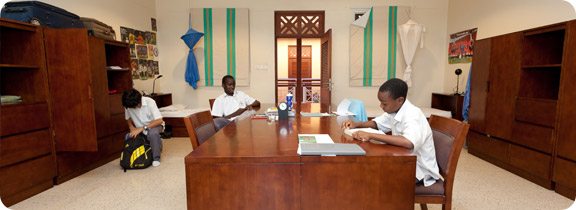
Residential Campus calendar
Please note these dates are subject to change. More specific, programme related information will be given as it becomes available.
| Date and Event | Notes |
| August 19, 2011 after 4:00pm Move-in day for new residential students |
Students move-in, accompanied by parent. Parents can stay the night in Mombasa and come back to campus on Saturday for breakfast. Parents depart after lunch. |
| August 20, 2011 before 6:00pm Move-in day for returning students |
Students to return to The Academy. Parents are encouraged to drop off their child and meet their new Dorm Parent. |
| September 6, 2011 Senior School Prize Giving |
On the 6th, awards ceremony at 2:45pm for Senior School students to recognize outstanding achievements from the 2010/2011 academic year. Parents are welcome to attend. |
| October 14-15, 2011 Parent-Teacher Conference and last day of school before mid-term |
Parents are highly encouraged to attend the Parent-Teacher conference during the day. Students are able to go home for the mid-term after meeting respective teachers. If parents do not attend, students still need to meet their teachers. Students will be able to leave for holidays only after meeting with teachers. Students are also able to remain on campus for the holiday. |
| October 23, 2011 Mid-term ends |
Students are required to report to school by 6pm. |
| December 9, 2011 Last day of school before December holidays |
Students are able to leave for holidays after 1:30pm. Please arrange flights after this time. The Academy officially closes on Saturday, December 10 after lunch. |
| January 3, 2012 December holidays end |
Students are required to report to school by 6pm. |
| January 6, 2012 Move-in day for new residential students |
Students move-in, accompanied by parent. Parents can stay the night in Mombasa and come back to campus on Saturday for breakfast. Parents depart after lunch. |
| February 15, 2012 Last day of school before mid-term and residential camp |
Students may leave after 4pm. Please do not make transport arrangements departing earlier than 5:30pm. Students may remain on campus for the holiday. For students in Years 6-8, the residential community goes on an expedition. The camp is mandatory for all students in Years 6-8 and is optional for older students. The cost of the trip is Ksh 10,000/student. |
| February 19, 2012 Mid-term ends |
Students are required to report to school by 6pm. |
| March 29-30, 2012 Parent-Teacher Conference and last day of school before April holidays |
Parents are highly encouraged to attend the Parent-Teacher conference during the day. Students are able to go home for the mid-term after meeting respective teachers. If parents do not attend, students still need to meet their teachers. Students will be able to leave for holidays only after meeting with teachers. Students are also able to remain on campus for the holiday. The Academy officially closes on Saturday, March 31 after lunch. |
| April 15, 2012 Easter holiday ends |
Students are required to report to school by 6pm. |
| June 22, 2012 Last day of school |
Students must clear with the Dorm Parent before they may leave. School ends at 12pm. Please do not arrange any transport before 4pm as students need to clear their belongings. |
Student experience at 2016 Peace Summit
The Peace Summit is an annual event conducted over a period of two days by the DP1 cohort for Year 9. It is one of the most actively student-driven events at AKA Mombasa. Preparation for the Peace Summit begins well in advance, with DP1 students starting to work on their modules since August last year. The main aims of this Peace Summit were to make us believe that peace is possible, empowering us to be leaders, showing us how to work together to resolve conflicts, and devising sustainable solutions to global issues. The main theme of this year’s Peace Summit was Conflict Over Resources, and our first activity at the Peace Summit was the Hunger Banquet.
The Hunger Banquet was an activity where Year 9 students were divided into three groups; low-income, middle-income, and high-income. Each group was treated differently according to their socioeconomic status. The poor people were given boiled rice, the middle class was served cake, and the rich people were provided with a proper breakfast. We were all in a place where we could clearly observe how the other groups were being treated. The Hunger Banquet was a very accurate depiction of our world today - less than one percent of the global population being rich, and the majority being poor. After this activity we concluded that the cycle of poverty affects generations and is really hard to escape. Also, the rich people group was only able to help a small number of poor people, which showed how the rich don’t have a large-scale impact on alleviating poverty. The Hunger Banquet was an amazing introduction as it made us think of sustainable solutions to breaking out of the cyclical nature of poverty – which was what the Peace Summit was mainly about.
We had two guest speakers come in during the Peace Summit to enhance our knowledge; the Manager of Facebook in Kenya, and a member of the COBURWAS. The Manager of Facebook in Kenya, Naheed Hirji, talked about how the internet can be used as a tool to create peace if used in the right manner, and how it has previously been used to destroy peace. He talked about the ways the world has improved due to technological advancement and also discussed the pros and cons of the internet. Our second guest speaker, Joseph Munyambanza, was a Congolese person who had lived in Uganda for most of his life and had worked in refugee camps on providing children education for a brighter future. He enlightened us with his journey and explained how his programmes help children in acquiring quality education. The two speeches were of great benefit to us, as they educated us about real-life attempts to create peace.
During the modules of the Peace Summit, we talked about different crises around the world and proposed possible solutions to them. We used many case studies such as – Coltan mining in DRC, and the water crises between Tajikistan and Uzbekistan. We talked about all sorts of things during these modules, analyzing each of these situations in-depth and suggesting better solutions for each issue. The Peace Summit provided us with a platform to debate current issues, propose solutions for them, and also reflect on them critically. These two days greatly helped us realize how privileged we are to have all the resources we do and to live in an environment much safer than many children who are currently suffering. It also made us believe that we can make a change, no matter how small – it will definitely impact the world in one way or another. We are all part of this world and we all contribute to the problems of the world in a positive or negative manner – so let’s make it positive and work on resolving the problems in our world. Let’s Make A Change!
--Tabreek Somani, Year 9 (The Reporters)
Nabil Patel: photographer par excellence and published author
Sharing practice across oceans
Andrew Jones is a teacher from Ontario, Canada who has spent the past year at the Aga Khan Academy Mombasa, working with the Junior School as part of a teacher secondment partnership between the Aga Khan Academies and the Province of Ontario.
On first arriving at the Academy Andrew said, “I [am] expecting an enriching experience that will allow me to learn about another culture by being immersed in it. I expect to grow as an educator because different settings, both culturally and through the [International Baccalaureate] programme, will allow me to expand my skill set as to how best practices support student learning.” One year later, he reflects on his experience.
Almost two years ago now, I was reading the book, Everyone Can Learn to Ride a Bicycle, by Chris Raschka to my new grade one class in Kitchener, Ontario, Canada. This book helps me encourage my students at the start of the year to continue developing resiliency through adopting a growth mindset by trying new things, taking risks and reflecting on both successes and mistakes. Little did I know, I was not just teaching my students this skill, but I was also going to follow this advice myself.
Ever since I began teaching almost 10 years ago, many changes in my job assignment have sparked a passion for professional learning and development in my teaching practice. Over this year, I have immensely enjoyed this new job working for the Ministry of Education in Ontario on an educational partnership between our government and the Aga Khan Academy Mombasa. I have had the opportunity to grow and learn as both an educator and an individual through my interactions at the Academy and through daily life in Mombasa.
Working at the Aga Khan Academy Mombasa has been an immense opportunity of both professional and personal learning that I am thankful for. I ask myself this very question, “What best teaching practices am I learning about that I should share with Ontario teachers?”
Here are three that I have learned more about since being here.
Building Confident Leaders – Students build their confidence and exude enthusiasm as they try new things and take risks during their participation in a variety of classroom activities, sports galas, enrichment opportunities and Friday assemblies. Students are confident, have strong leadership skills and advocate for equity. Confidence stands out as a defining characteristic of the learners present here in the Junior School.
Promoting Pluralistic Thinking – The Junior School’s demographic is vibrant and diverse, reflective of the Mombasa community’s cultures, religions and backgrounds. Activities at the school, such as the Arts Week performance, continually emphasise appreciation and understanding toward different views and beliefs and encourage students to think pluralistically as they work together.
Dual Language Practices – I have been learning Kiswahili “pole pole” this past year, and I am quite experienced in giving directions to tuk tuks and boda bodas. As I learn a new language, it helps me think about the world in different ways and makes me more pluralistic in my thinking. Likewise, students at the Academy develop academic competency and fluency in both the national language of Kenya, Kiswahili, and the official language of Kenya, English. Additionally, learning similar concepts in two languages allows students to develop pluralistic view points as languages sometimes look at similar ideas in different ways.
I am thankful to explore Kenya’s beauty and diversity, so far from Mount Kenya to the Masai Mara to Mombasa. I continue to grow and to learn and am thankful to the kind and generous Mombasa community that has made my transition to working at the Academy warm and welcoming. I feel very privileged to be working with such a dedicated and caring staff and with phenomenal students.
By Andrew Jones
Mukhi Family: Cherishing the Academy's nurturing environment
“Through our chain of observation, the Aga Khan Academy Mombasa surely plays an active role in the holistic development of every child. This is our consistent finding all through the two years of IB Diploma programme our daughter studied. This two-year journey at Aga Khan Academy Mombasa was fully laden with profound experiences that we cherish, as we have eventually seen our daughter progress in all domains of development.”
Faliha Altaf Mukhi graduated from the Aga Khan Academy Mombasa in 2017 with an International Baccalaureate Diploma and is now pursuing her Bachelor’s degree in Global Business and Digital Art at the University of Waterloo, Canada. Faliha's proud parents, Aneela and Altaf Mukhi, are very happy with their child’s experience at the Academy. “The overall progress that we have seen in her is outstanding, both academically and non-academically!” they exclaim.
Faliha’s parents reside in Kampala, Uganda. Enrolling their daughter at the Aga Khan Academy, they say, was one of their best decisions. They feel that the educational experience provided by the Academy is exceptional, in the Eastern African region and beyond.
According to her parents, Faliha was able to take advantage of a number of development opportunities during her two years at the Academy. For example, she was the president of the Green Gang, an environmental protection endeavour, and was also involved in reporting for the school's website. In addition, Faliha participated in several information technology projects such as database creation and graphic design – she designed certificates, logos and marketing materials. “This experience at the Academy contributed tremendously towards her dream career in digital art. Through the Academy, she also had an opportunity to intern at the Aga Khan Foundation Uganda which further increased her IT skills and leadership capacity,” her parents mention proudly.
“The Aga Khan Academy Mombasa is modern and well informed in implementing an effective educational approach,” say Aneela and Altaf. They particularly appreciated the communication facilitated by the Academy through which parents are kept up to date on the curriculum, activities, assignments, results as well as overall performance. “This regular monitoring through effective means of communication helps the parents to take immediate action and ask for assistance from the very cooperative and talented teachers,” they comment.
For Faliha’s parents, the Aga Khan Academy helped tap into the hidden talents and potential of their child. “The day we were informed by our daughter’s mentor that she had successfully led her team towards their destination on their mountaineering adventure on Mount Kassigau, we felt very proud indeed! It made us reflect on her perseverance, leadership and analytical ability for problem solving. These innate abilities, somehow, remained subdued before this experience at the Academy,” they note.
“I can happily say that the Aga Khan Academy Mombasa expresses all the traits of a learning community with all stakeholders having shared values and vision. Students at the Academy are active participants in learning... Such an environment truly nurtures them fully,” says Aneela. Moreover, Faliha’s parents find the systems at the Aga Khan Academy Mombasa to be well organised, and they commend: “Residential and academic, both sectors are remarkably performing to the best of their ability. Well done all!”
Qamili Dave (Class of 2017): Mastering the art of cooking
Qamili Dave is a passionate culinary arts professional from Mombasa, Kenya who graduated from the Aga Khan Academy Mombasa in 2017, which she joined in Year 1.
For Qamili, being part of the Academy was such an interesting and enriching experience - something she is always appreciative of as it shaped her to be the person she is today. For one, the open and trusting environment cultivated at the Academy helped to elevate her self-confidence as she fondly recalls, “The Academy really helped me to stand up for myself. I felt so safe asking teachers questions and they always encouraged it.” Joining college, she would continue to carry herself with the same confidence, eventually running and winning to become Student Council President at Boma International Hospitality College for two terms.
If there’s one accomplishment Qamili is really proud of during her time at the Academy, it is the exciting opportunity she was afforded to intern at the Serena Beach Hotel Mombasa through the Aga Khan Development Network Internship Programme. This chance, she says, defined the course of her career and future as it is where she became certain about pursuing a career in culinary arts. “Although I knew I loved to cook, I wasn’t sure it was the right profession for me. However, during my internship I realised I was on the right path. It was hands down the biggest stepping stone to my career because I learnt almost all the basics and this made college a breeze,” says Qamili. “The experience also introduced me to the real working environment; how to formally interact with people and some of the challenges I would face while working. All in all, I really enjoyed it.”
Although she has had to move back home to Mombasa after graduating college because of the impact COVID-19 has had on the hospitality industry, Qamili says this has in fact been a blessing in disguise. She has used this time to complete two online Harvard courses - ‘Science & Cooking: From Haute Cuisine to Soft Matter Science’ in both chemistry and physics. She has also dedicated this time to grow her food page (@chaqula_) on Instagram and explore recipes from different cultures. In addition, Qamili has been helping out her parents with their advertising and signage business ‘Eyecatchers & Daughters’, which she says has taught her a lot about running a business.
“It’s been eye opening and refreshing,” Qamili says of the experiences.
Having found what she believes to be her calling in life, the thing that Qamili loves most about being a chef is preparing a good satisfying meal that warms the hearts of people, especially her loved ones.
For her words of wisdom to current students at AKA Mombasa, Qamili says: “I would tell them to appreciate their teachers and everyone supporting them. I would also tell them to work smart; to be effective and efficient in everything that they do. Lastly, I would advise them to take advantage of the internship opportunities provided by the Academy to get as much exposure as they can as this will really give them insight on the career path that is right for them.”
